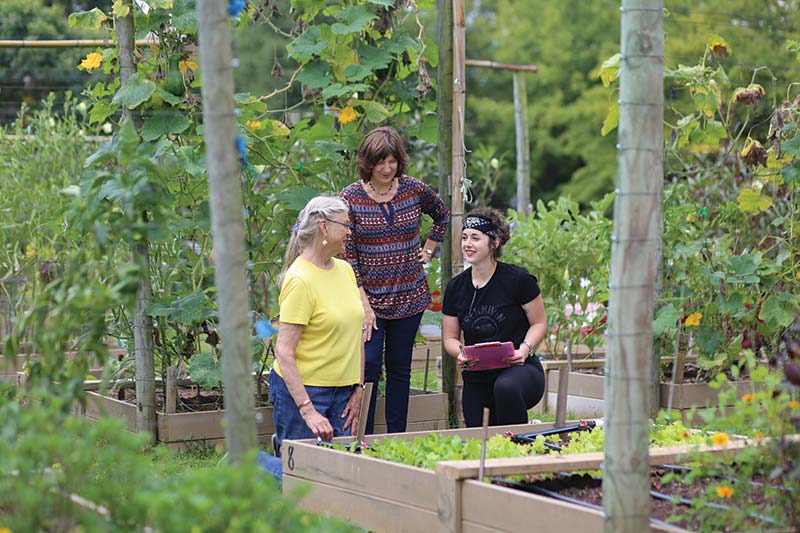Greening Religion
- By Sarah Lindenfeld Hall
- Published

When ants started forming hills near the entrance of Raleigh’s Buddhist Kadampa Center and coming into the building, members faced a conundrum.
They needed to keep the ants out, but they couldn’t simply set out ant bait or spray pesticides. “Do no harm,” a basic tenant of the Buddhist faith, extends to creatures many might think disposable. What could they do?
It was a surprising quandary for Cheyenne Daniel, ’17, a psychology and religious and ethical studies major. Daniel, who is Christian, learned about the center’s dilemma first hand when she interviewed members as part of an environmental ethics class in 2016.
Led by Shannon Grimes, associate professor of religious and ethical studies, the class includes work on an academic study to track how local faith communities practice environmental stewardship. The study began in 2014 and will wrap up this spring with a third round of interviews. A final report could be complete next summer.
“Religion is a good way to look at how people feel about the environment and how that can inspire activism – or at least a desire to take care of our world,” Grimes said.
For students involved, the experience was a way to see how the concepts and theories they’d learned in the classroom unfold in the real world.
“You can read so much in books, but what you read doesn’t always apply to how it’s practiced in a faith community,” said Daniel, now a graduate student at UNC-Wilmington.
Grant supports study, other sustainability initiatives
Grimes’ study was supported by the Meredith College Environmental Sustainability Initiative, which was funded by a significant grant from the Margaret A. Cargill Foundation.
The grant covered faculty and student research, new curricular development, campus convocations, the initial planting of the organic garden, and other projects that also related to sustainability and enhanced Meredith’s environmental sustainability program. Grimes used the funding to take time away from the classroom so she could come up with a research project.
“I’m interested in what local congregations are doing and the struggles they have,” she said. “It’s a microcosm of what a city could do.”
At the time, more congregations were addressing sustainability. Community gardens were popping up. And, nationally, churches were rewarding green practices. The Presbyterian Church certifies churches as Earth Care Congregations, for instance. The United Church of Christ offers green church certification and recognition programs.
“It was becoming more visible, more important, and more discussed,” Grimes said. 
Study aims to be model of sustainability
As she developed the research project, Grimes created a basic set of questions to ask local congregations. They explore an institution’s ecological beliefs; its green practices on campus; its congregants’ involvement in eco-justice issues; green investments or donations; and the challenges and successes they face.
Students also helped design the study. In 2014, before selecting the congregations to interview, students chose to include a variety of faiths. Students also wanted the study to be a model of sustainability, selecting congregations that are no more than three miles from campus.
“We wouldn’t be driving across town,” Grimes said. “We would be carpooling, close and local.”
The final list of congregations included three Christian churches – Community United Church of Christ, Highland United Methodist Church, and the Unitarian Universalist Fellowship of Raleigh, along with the Kadampa Center, the Islamic Association of Raleigh, and the Church of the Earth, a non-denominational pagan faith community.
Pullen Baptist Church was added in 2015. The church was involved in another study by Meredith students and led by Angela Robbins, assistant professor of history, one that looked at changes to older buildings to make them environmentally sustainable.
‘Eye-opening experience’
Once the questions were established and the locations were selected, students fanned out to each of the faith communities.
In 2014, some students from the environmental ethics class participated. In spring 2016, all two dozen students got involved. They divided up into small groups, each picking a different faith community to interview.
One group selected the Church of the Earth. Among the students in the group was Becca Brady, a senior who is majoring in English and religious and ethical studies and who grew up Southern Baptist. Her father is a pastor.
“The Church of the Earth was the furthest thing from my background,” Brady said. “That’s why I chose it. … I don’t think interviewing people who believe the same way you do is doing much for you as a person. You don’t really learn a lot until you put yourself out there in situations with people who believe completely differently from you.”
For Church of the Earth members, a core belief is that the Earth is our mother and people should cherish and nurture her, Brady said. Ceremonies open and close by recognizing the elements – water, earth, air, and fire.
“It was an eye-opening experience to be surrounded by people who really believe in living as natural lifestyles as they can live in the Western world in 2017,” she said.
For Daniel, the class helped her see the deep connection between religion and the environment.
“I really hadn’t thought much about it before taking the class,” Daniel said. “But once I saw the idea presented, it seemed so obvious because taking care of the Earth and sustainability of the Earth is such a prominent idea in a lot of religious traditions. It made perfect sense.”
The interview with the Buddhist Kadampa Center, said Daniel, explored the center’s environmental efforts, which include a garden and volunteer efforts in the community, along with day-to-day life choices such as, in many cases, vegetarian diets and the use of compostable plates and cups at potluck meals.
 “They are environmentally conscious because at the core of their beliefs is ‘do no harm and preserve life,’” she said.
“They are environmentally conscious because at the core of their beliefs is ‘do no harm and preserve life,’” she said.
She also learned how the center resolved that ant issue. Center members put down a thick line of cinnamon, a natural repellant, and closed up the crevices where the insects were coming in. “It’s their religious responsibility,” Daniel said, “to go out of their way to make sure the lives of these ants are preserved.”
‘Walk gently here’
Representatives from some of the faith communities involved in the study said they have welcomed the chance to share their beliefs, their sustainability efforts, and their challenges.
At Highland United Methodist Church, Donna Wolcott said Micah 6:8 is a guiding Bible verse as the church works on social justice issues, including environmental sustainability. The verse says: “What does the Lord require of you? To act justly and to love mercy and to walk humbly with your God.”
“To do justice is not to deprive future generations of a healthy planet,” said Wolcott, a member of the church’s Micah 6:8 team and its green committee, and coordinator of the church’s large community garden. “… We are not the boss of God or his creation. We are to walk gently here and leave it better than we found it.”
The belief that everything is interconnected guides Buddhist followers, according to Elise Strevel, outreach coordinator at the Kadampa Center. “We do no harm because we are so dependent,” Strevel said. “Anytime you create harm, you also are harming yourself. We try to take that belief very seriously and as much as possible down to the smallest thing.”
Strevel said it’s been “really lovely” being part of the study.
“It made me feel really nice to read the feedback,” she said. “It kind of opened my eyes too and made us rejoice in our own merit. How nice it is that we seem to be doing a good job. Our teachings are right. Our intentions and efforts are genuine and it’s made a difference.”
At the Church of the Earth, Richard Moore, the council chairperson, said environmental stewardship plays a central role and church members are eager to help out. The church recently started a community service initiative that includes cleaning up waterways and other outdoor spaces.
“We have quite a few people interested in getting involved in these projects,” he said. “We have trouble finding environmental stewardship projects that will take large groups.”
‘Seeing and connecting’
After the final round of interviews in the spring, Grimes, likely with the help of students, will pull together all of the research to look for trends and patterns. In the past two years, environmental issues have been at the forefront of political debates and news headlines. Grimes expects topics such as climate change may come up in this final round of interviews.
“We do ask the same questions, otherwise, you don’t get a solid set of data over time,” Grimes said. “But I’m interested to see how things will change and if they change in this political climate.”
Regardless of the final report, Grimes said the conversations Meredith students have had in the community are important for their own growth and education.
“They can see that research is a sharing of information,” Grimes said. “The process of just doing the research, going and talking to people and asking questions, and having a conversation about these things is valuable.”
Said Erin Lindquist, associate professor of biological sciences and environmental sustainability program coordinator: “We’re getting the students out in a real situation. It’s not a classroom where they are focused on a text or whatever the teacher is thinking. It’s really seeing and connecting what they learn in class to how it actually functions in reality. … And I’ve had students who really get excited about the topic and want to go further with it with an internship or a research project or a career.”
Indeed, Grimes’ class and study were a catalyst for Brady to declare a major in religious and ethical studies and to study abroad in Iceland where she learned about environmental sustainability and eco-tourism.
“Any class you take at Meredith is going to have a greater impact on you because of how personal the education is,” she said. “When you’re in a class of 20-something people, you have to participate more and you have to make sure you have read very carefully. And because the education is so personal, the takeaway is that much more personal.”
News Director
316 Johnson Hall
(919) 760-8087
Fax: (919) 760-8330


3800 Hillsborough Street Raleigh, NC 27607-5298 | (919) 760-8600 Fax: (919) 760-8330 | © 2022 All Rights Reserved.